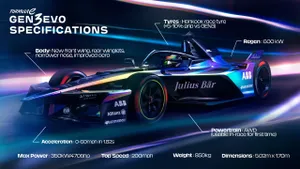NanoGraf CEO Talks Batteries & the EV Boom
Dr. Francis Wang, CEO of battery material startup NanoGraf Corp., shared his thoughts about the electric vehicle market and what battery technologies can lead the way.
July 12, 2022

In 1998, Dr. Francis Wang received his PhD in Solid State Chemistry, a moment that would mark the start of a long and important career in the battery industry. From that point on Dr. Wang has worked at a number of prominent companies within the battery industry focusing on technology innovation and commercialization in the energy storage and clean energy space. During this time, he has claimed over 45 US patents and 20 scientific publications.
Today, Dr. Wang is the CEO of NanoGraf Corp., an advanced battery material startup whose patented silicon-graphene anode technology enables longer-lasting, higher-energy, and higher-power, lithium-ion batteries for consumer electronics to electric vehicles. Battery Technology asked Dr. Wang his thoughts on the current EV boom, it’s impact on the battery market, and how he sees the future playing out.
In your opinion, what is the most significant way that the current EV boom impacts the battery market?
The EV boom is driving the battery market like never before. I think the single greatest impact will be the diversification outside of Asia, including supply chains.
Do you believe that conventional lithium-ion batteries are the correct path forward for enabling longer-range EVs?
The industry appears to be learning as we go about the importance of range. The rise of LFP batteries suggests that most mainstream users don’t need the range and that in fact, price is a much more important metric than distance. The proliferation of charge stations, coupled with fast charging versions will more than likely make range a smaller issue.
What are the shortcomings of conventional lithium-ion batteries for EV applications?
Cost is still the biggest issue (that is getting worse with metals price fluctuations). I think we will be hearing more about supply chain issues over the next decade. There is a reality where there just aren’t enough materials to meet the EV demand.
If not conventional lithium-ion batteries, what emerging battery technologies are you most excited about and why?
Of course, I’m a believer in silicon anodes as the next big thing, in terms of extending EV range. The cycle life has been improving year after year, and I predict a world where a high percentage of silicon (with good cycle life) will be on the market in the next 2-3 years.
Your company NanoGraf focuses on silicon-based anode materials, what are the benefits of replacing a conventional graphite-based anode?
The biggest benefit is energy density, which translates to longer EV range, and perhaps lighter vehicles.
In your opinion, what is the upward limit on EV range and battery technology? Can we ever truly make an EV that is as easy and convenient as gas-powered vehicles?
Absolutely. After all these years, there are still improvements in battery materials and battery cell designs. I think there is certainly more to come in the way of power-type batteries, which will change the way we think about charging.
Any advice for young engineers hoping to stake out a career in batteries and energy storage?
Come and work at NanoGraf! It is hands down one of the best venues to work and learn about lithium-ion batteries.
About the Author(s)
You May Also Like





